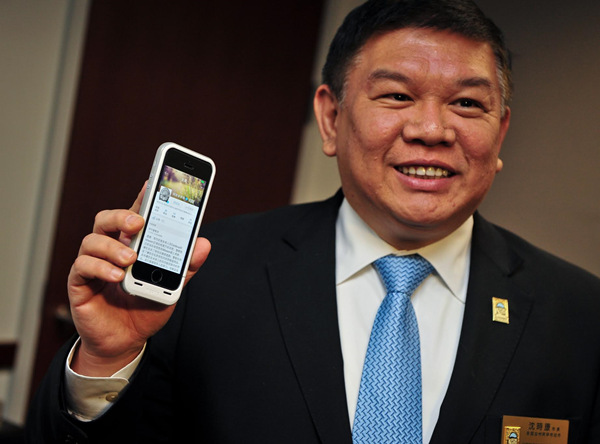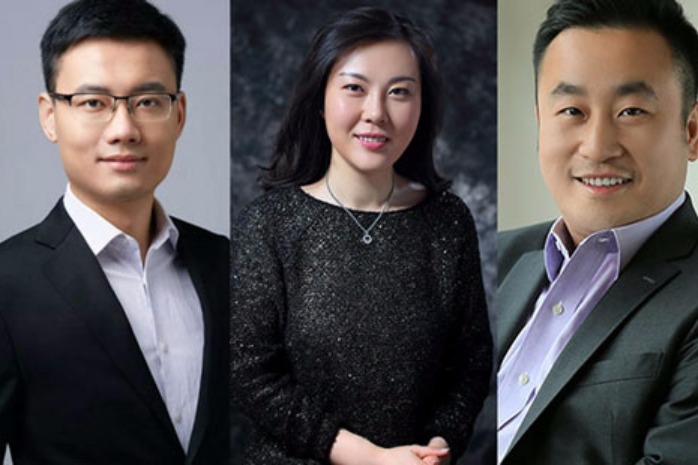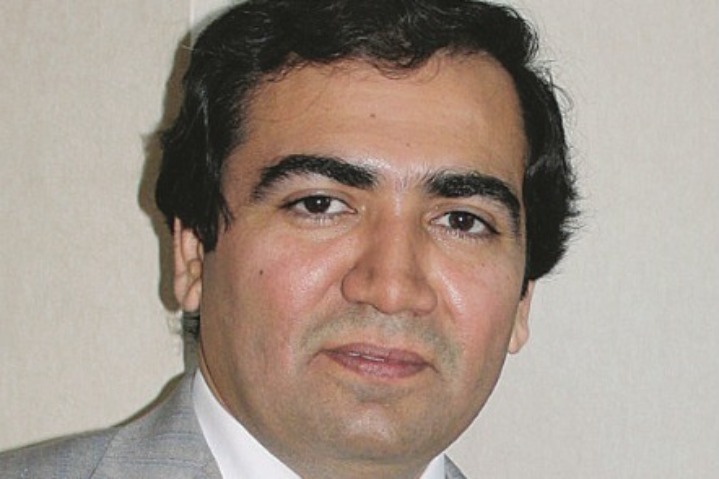A son of China makes history in US city
 |
| Stephen Sham shows the Weibo account of an Alhambra Police Department, which was opened with his support in 2013. Provided to China Daily. |
Sitting in the inside room of Vineyard Cafe in Wudaoying hutong in Beijing, Stephen Sham looks no different from a local businessman. When he begins to speak to order a latte in Mandarin, his accent is every bit native Beijinger.
Sham made history by becoming the first Chinese mayor in 2006 in the 112-year history of the Los Angeles-area city of Alhambra, California. He was, however, not elected mayor directly by the people of the city.
Under the city’s system of government, Sham serves as one of five members of a city council. Each council member represents a district and is elected to the council by voters of their particular districts. The five council members take turns, serving up to nine months as mayor on a rotational basis.
The city is actually run on a daily basis not by the mayor, but by a full-time town manager. The members of the council serve part time and often have other professions from which they make a living. Members of the council earn a salary of a little more than $10,000 a year. According to the city’s website, council member Luis Ayala currently holds the position of mayor, with Sham’s nine-month stint having expired.
Still, when Sham had assumed the role of mayor of Alhambra, located at the gateway of San Gabriel Valley, it was a milestone for the city, which has a larger proportion of Asians than many other cities in the state.
Since he first ran for City Council and became the mayor in 2006, Sham has made quality of life issues his focus. While in the role as mayor, he worked to see the community flourish.
“My priorities are to make sure Alhambra is a safe community, where kids can get a quality public education and where businesses and families can succeed and thrive,” he said. “I want to make sure businesses and families have access to the resources they need —well-maintained streets, utilities, and an environment conducive to business.”
When his latest term as a city council member began in May, he was well aware that the prosperity of a community must be achieved with the full participation of all residents, and in the case of Alhambra, specifically by engaging the Asian or Chinese-American community.
Alhambra has about 100,000 residents and of that number more than 50 percent are of Asian descent. Of that percentage, approximately 65 to 70 percent — or around 30,000 residents — are of Chinese background.
The Chinese-American population is larger than the total population in many cities in Southern California in which Asians are the majority.
Since the 1980s, Hispanics and Asians, mostly Chinese-Americans, have poured into Alhambra. Surveys show that the ranking of the major languages in the community are Chinese, Spanish and English.
“Chinese people are used to working hard and living a conservative lifestyle as immigrants. Believing in minding our own business, we seldom get involved in politics or any other civic engagement,” said Sham. “So we never participated enough in the local society or represented as part of our community.”
He added: “But as Chinese would like to protect their rights and earn respect, they should know how to make their voices heard.”
Sham was born in Beijing and moved to Hong Kong with his family at the age of 10. He emigrated to the United States and enrolled in a high school in California, where has been living in the city of Alhambra for more than 12 years. He still has relatives living in Beijing.
Sham, a naturalized American, feels his Chinese characteristics are deeply rooted in the culture but he also shoulders more responsibility in his position on the council to help other Americans acknowledge the Chinese community and help Asian residents blend into the community.
When attending meetings across the US, Sham finds many Americans raise issues about China, such as copyrights, human rights and other stereotypes, but rarely see other areas.
“After traveling much back and forth between China and the US, I really see the changes happening to the country and we’d better be well aware of them,” he said, “and then we can grab a better understanding in our community.”
As for his Chinese neighbors in Alhambra, Sham is always ready to offer advice about business and life.
“Many cultural differences are not written in the rules, but hidden in the execution of daily life. It is not easy for Chinese people, though a major group of citizens in our city, (to blend into the community) well,” he said.
Connecting communities as well as encouraging more civic engagement is among the first of three priorities Sham set since his first term.
Sham has been a part of the Alhambra community for decades. In addition to being a resident for 12 years and business owner for 20, Sham has served as president of the Alhambra Chamber of Commerce, Rotary Club of Alhambra, and many other associations.
“I regularly convene the Asian press and have made it a priority to attend ethnic events and meetings in the area, engaging the Asian- American community to discuss issues of concern and work with my fellow council members to make sure City Hall is reaching out to the larger community,” he said.
One thing he tried to do to enhance community participation is to support the opening in 2013 of an Alhambra Police Department Weibo account, a Twitter-like platform, for the ethnic Chinese residents in the neighborhood, through the initiative of Alhambra Chief of Police Mark Yokoyama.
Most of the content on the social media page is necessary information for living in local neighborhoods, with some directly translated from the police department’s Facebook page.
Several crime tips have been reported to the police through the online social platform, said Walter Yu, who is among a younger generation of immigrants between the ages of 24 and 36, the group that is a main target of the two-way communication attempt. The feedback from the younger generation of users has been very positive.
“It is more important to give all a sense of being at home who live, serve and work in Alhambra,” said Sham. “By all means the community is a home to all residents.”
Though Sham has made it a priority to engage the Asian-American community since he was elected, it turns out minority voters, especially Asian-Americans and Latinos, have a lower voter turnout rate than other groups, according to the local resource center in Alhambra.
Despite his re-election to the council this year, many Chinese-American did not show up to vote. Some of them have no knowledge of how to vote while others simply showed little or no interest.
The ethnic Chinese residents in that community were reported to score significantly lower on neighborhood belonging, collective efficacy and civic engagement compared to whites and Latinos, according to Alhambra Source, a local news website that uses journalism to bridge the gap between multilingual residents and city government and to promote civic engagement.
Sham in his engagements with people in China has struggled to explain to them Alhambra’s system of government and the mayor’s part-time role within that system.
“It is hard for me to explain it to my counterparts in China,” he said. “I feel it is like I am bridging the comprehension gap.”
Contact the writer at zhang-yuchen@chinadaily.com.cn


















